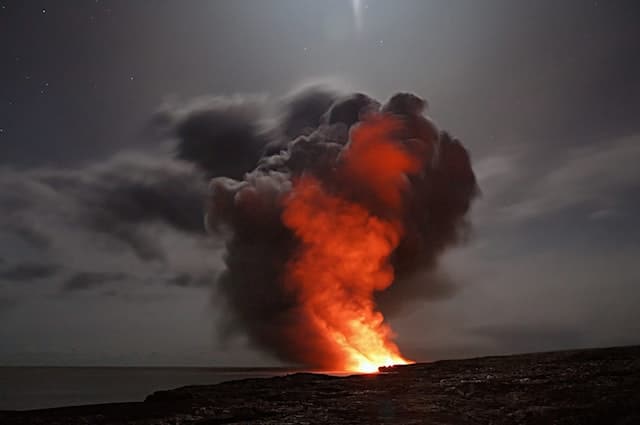Earthquakes are natural disasters that can strike at any time and can be devastating. So, if you live in an area that is prone to earthquakes, it is important to consider purchasing earthquake insurance.
Despite the fact that earthquake insurance is not required by law, it can help with the costs of rebuilding or repairing your home and replacing your possessions after an earthquake. It can also help to cover the cost of additional living expenses, such as hotel and restaurant bills if you are unable to live in your home after an earthquake.
So if you are asking if getting earthquake insurance is worth it, you just need to consider a couple of factors, including the risk of earthquakes in your area, the value of your home and belongings, and your financial situation. If you live in an area with a high risk of earthquakes and cannot afford to pay for repairs or rebuilding out of pocket, earthquake insurance is probably worth it.
Let’s go into more details, starting with the basics…
What Exactly Is Earthquake Insurance?
Earthquake insurance protects your home in the event of damage caused by an earthquake. This insurance is different from standard homeowner’s or renter’s insurance.
If an earthquake damages your home and you don’t have earthquake insurance, you’ll most likely have to pay for repairs out of pocket. If a property you want to buy is in an earthquake-prone area, the seller may disclose this in a Natural Hazard Report.
Most standard homeowner’s insurance policies exclude earthquake coverage.
What Does Earthquake Insurance Cover?
Your individual policy will determine what your earthquake insurance covers. An earthquake insurance policy, in general, consists of three parts:
- Dwelling coverage, which assists you in paying for the repair or rebuilding of your home.
- Personal property coverage, which assists you in replacing damaged personal items such as furniture or televisions.
- Loss-of-use coverage, which pays for your temporary, extra living expenses if you have to live somewhere else while your home is being repaired.
Furthermore, your insurance policy may include (or offer as an optional rider) building code upgrade coverage, which means that if you need to rebuild your home at a higher cost because the original structure isn’t compliant with current building codes, your insurance will help pay those additional costs.
Meanwhile, to obtain additional coverage, inquire with your insurer about the different types of riders they provide. Homes with masonry veneers are one example; to have your earthquake insurance pay for this type of exterior repair, you must purchase coverage specifically for this purpose.
Is All Earthquake Damage Covered?
Earthquakes can cause a wide range of damage that can lead to a variety of problems in the future, raising the question, “Which of my insurance policies kicks in after an earthquake?”
Assume that an earthquake causes a pipe in your home to burst, resulting in extensive water damage. Is that something your earthquake insurance covers? What about flood insurance? Do you have standard homeowners insurance?
In this case, your homeowners’ insurance will most likely pay to repair the damage.
However, if the earthquake caused water to flood your home from outside, your flood insurance would cover you. If an earthquake caused a fire in your home, standard homeowners insurance would almost certainly kick in again.
A comprehensive car insurance policy would cover repairs if your vehicle was damaged in an earthquake.
In short, earthquake insurance does not cover all of the damage caused by an earthquake. In many cases, other types of insurance may cover repairs or replacement of damaged property, but you should still receive the coverage you require.
What isn’t Covered
Typically, an earthquake policy will not cover:
- Fires started as a result of an earthquake. That should be covered by your homeowners, renters, or condo policy.
- Damage to the vehicle. If your auto insurance policy includes comprehensive coverage, earthquake damage to your vehicle will be covered up to the policy limits, minus your deductible.
- Floods. Even if the flood is caused by an earthquake, you’ll need separate flood insurance for this damage.
- Sinkholes. This coverage may be added to your homeowner’s policy.
- Masonry, such as the brick, stone, or rock used for the exterior of your home. (As previously stated, you may be able to purchase additional coverage for this.)
- Damage that existed previously. Earthquake insurance will not repair any damage that occurred prior to the purchase of the policy.
How to Buy Earthquake Insurance
Start with your current homeowners or renters insurance company if you’re looking for earthquake insurance. Inquire whether it is an add-on to your existing policy or a stand-alone earthquake policy.
Home insurance companies in California are required by law to sell earthquake coverage. The California Earthquake Authority, or CEA, is the state’s primary provider of earthquake insurance. It collaborates with dozens of companies to provide policies for homeowners, renters, condo unit owners, and manufactured home owners.
Residents in California, Oregon, and Washington can purchase standalone earthquake policies from GeoVera or Arrowhead, the latter of which is an agency that sells policies from multiple companies.
If you live in another state and your current insurer does not provide coverage, you will need to shop around. Consider contacting a local independent insurance agent who works with a variety of companies. The website of your state’s Department of Insurance can also help you find licensed earthquake insurers in your area.
How Much Earthquake Protection Do You Require?
If you own a home, your insurer will usually set the same dwelling coverage limits for earthquake and home insurance. This represents the estimated cost of rebuilding your home rather than its market value. If you are a renter, you do not need to add dwelling coverage.
Your personal property coverage limit may be set low at first, around $5,000, but you can increase it to your insurer’s maximum. However, your insurer’s payment for certain items, such as computers, may be limited. A home inventory can assist you in determining the value of your possessions.
Consider how much it would cost you to spend weeks or months living somewhere else if your home needed to be repaired for an extended period of time. F
What Is the Cost of Earthquake Insurance?
There’s no getting around it: earthquake insurance is expensive, and the more likely you are to need it, the higher the cost will be.
The cost of your policy is determined by the amount of coverage you purchase, your deductible, and factors related to the home itself, such as its age and location in relation to known faults.
Annual earthquake insurance premiums can range from $800 to $5,000, with policy deductibles ranging from 10% to 20% of your coverage limit.
Your deductible is the amount you must pay out of pocket before your insurance kicks in. Because many damaging earthquakes occur in California, where home values are high, these high percentage-based deductibles may cause homeowners to reconsider whether purchasing coverage is even worthwhile.
Assume you purchase earthquake insurance for the full value of your home: $500,000. If your policy has a deductible of 20%, you will be responsible for the first $100,000 in repairs before your insurance will pay out. If your home sustains less than $100,000 in earthquake damage, you’ll probably wonder why you spent $1,000 – $2,000 on an annual premium.
It’s best to get a direct quote from an earthquake insurance agent.
Is Earthquake Insurance Worth It?
According to the US Geological Survey (USGS), when deciding whether to purchase earthquake insurance, you should consider the following factors:
- Your proximity to active faults
- Your area’s earthquake frequency
- How long has it been since the last earthquake?
- The construction type, layout, materials used, and quality of your home
- Whether or not your house was built with earthquake safety in mind
- The type of land on which your home is built, including the soil type and slope of the land
- The amount of rain that falls each year
- The worth of your residence and its contents
- The cost of home insurance
Is Earthquake Insurance Necessary?
The factors listed above may appear excessive, but whether you require earthquake insurance really boils down to three simple questions:
- What is the likelihood of an earthquake occurring?
- How likely is it that an earthquake will damage your house?
- Would you be able to repair your home after an earthquake without the assistance of insurance?
That last question is crucial. Though the vast majority of the world’s average 55 earthquakes per day cause no or minor damage, it only takes one large one to cause catastrophic damage to your home.
While earthquake insurance is useful if your home is severely damaged and the damage exceeds your deductible, the high premiums and deductibles associated with earthquake coverage can create an uneven balance between what you pay and what you get.
According to the Federal Emergency Management Agency (FEMA), the majority of prospective earthquake insurance buyers are unlikely to sustain damage that exceeds their deductibles.
Deductibles for Earthquake Insurance
Earthquake policies typically have a high deductible, which is deducted from your claim payment. While your homeowners policy may have a flat-rate deductible of $500 or $1,000, earthquake deductibles are typically a percentage of your coverage limits. Depending on your insurer, these percentages can range from 2.5% to 25%.
Another distinction is that, unlike home insurance, which typically has a single deductible that applies to both the structure of your home and your possessions, some earthquake insurance companies use separate deductibles for each part of the policy: dwelling and personal property. (Temporary living expenses are typically not deductible.)
Higher deductibles can save you money on premiums, but they may leave you with a large sum to cover yourself after an earthquake. Here’s an illustration:
You’ve insured your house for $300,000 and your belongings for $150,000, each with a 20% deductible. If a severe earthquake destroyed your home and your belongings, your insurer would deduct $60,000 — 20% of your dwelling coverage limit — from the claim payout for rebuilding your home.
The same is true for your belongings. The insurer would deduct $30,000, or 20% of your personal property limit of $150,000, from your policy.
You could end up being responsible for $90,000 in repairs that insurance would not cover. In the case of minor damage, you may not receive any compensation if the total cost of repairs was less than your deductible.
That is why it is critical to carefully weigh the cost of your premiums against the amount you could afford to pay if your home was damaged by a major earthquake.
Is earthquake coverage included in renters insurance?
Most renters’ insurance policies exclude earthquake damage, but there are some exceptions. USAA offers earthquake coverage in its renters insurance policies to active military, veterans, and their families. Toggle, a newcomer to the Farmers family of insurance companies, covers earthquake damage in most of the states it serves.
Is earthquake insurance taxable?
Except for mortgage insurance premiums, you cannot generally deduct any insurance purchased for your primary residence. However, if you use your property for rental purposes, you may be able to deduct the cost of insurance.
Best Earthquake Insurance Companies
#1. Amica
Amica provides earthquake insurance as an add-on to standard homeowners insurance policies, but you can also use them to purchase other types of insurance, such as auto insurance or umbrella insurance coverage.
It was founded in 1907, so this provider has a long history of providing its customers with high-quality insurance products. They also have an A+ rating from AM Best for financial strength and ranked first in J.D. Power’s projected 2021 U.S. Home Insurance Research.
You must speak with an agent if you want to add earthquake insurance to your existing Amica homeowners insurance policy. You should also know that Amica offers a variety of add-ons for their homeowners insurance policies, such as flood insurance, personal property replacement coverage, valuable items coverage, and more.
Keep in mind that, even though this coverage is provided in collaboration with the CEA, you will still need to file a claim with Amica if you need to use your insurance. This means you’ll have access to Amica’s excellent customer service and their online claims centre.
#2. The ICW Group
ICW Group was founded in 1972 and is the largest privately held insurance company group in California. The company provides insurance policies in all 50 states as well as Washington, D.C.
The most significant disadvantage of working with ICW Group is that you must contact them in order to be put in touch with a local agent before receiving a quote. Because you purchase this coverage from a local agent, factors such as customer service and the claims process may vary.
#3. American Family Insurance
American Family Insurance Company, founded in 1927 as Farmers Mutual Automobile Insurance Company, has grown to become one of the most prominent and popular insurers in the United States. AM Best has also given American Family a strong A rating for financial strength.5
When it comes to earthquake coverage, you can purchase insurance to protect your home, garage, and other structures on your property. American Family earthquake insurance also covers your fences, driveway, sidewalk, and personal belongings. You can also use this provider to purchase earthquake insurance for a condominium you own or rent.
One disadvantage of American Family Insurance is that, like the other companies on our list, you must speak with an agent and provide extensive information in order to receive an earthquake insurance quote.
#4. Liberty Mutual Insurance Company
Because of their online application and claims process, Liberty Mutual stands out for earthquake coverage for renters. Liberty Mutual, which was founded in 1912, has been providing high-quality insurance products for over 100 years. AM Best has given this provider an A rating for financial strength.6
Although not all providers specifically offer earthquake insurance for renters, individuals who rent may still want earthquake coverage for their personal belongings, even if they do not own the property. Liberty Mutual earthquake insurance covers not only damage caused by an earthquake, but also damage caused by aftershocks within 360 hours of the earthquake. You can apply for Liberty Mutual earthquake insurance as a renter online, but you won’t know if your area is eligible for coverage until you complete the application process.
Liberty Mutual is also notable for its online claims process, which allows you to file and manage claims through a digital dashboard. Liberty Mutual also has a mobile app that allows you to pay for your policy, track your claims, and view your insurance policy details with just a few clicks.
Finally, in addition to their renter’s insurance policies, Liberty Mutual provides popular homeowners insurance coverage.
#5. GeoVera Insurance Company
GeoVera Insurance is unique in that it only provides catastrophic coverage for specific events, excluding auto insurance, homeowners insurance, and other common types of insurance. This provider’s emphasis on catastrophic insurance coverage, on the other hand, can be viewed as a major plus because this is clearly their area of expertise. AM Best has given GeoVera an A rating for financial strength.7
While GeoVera Insurance provides windstorm and hurricane damage coverage in Hawaii, their main product is earthquake coverage. GeoVera offers several levels of earthquake insurance, including comprehensive coverage with a 10% deductible in Washington and Oregon.
GeoVera Insurance also provides coverage for structures, personal property, and loss of use.
#6. Country Financial
Country Financial distinguishes itself from the competition by receiving high ratings from third-party rating agencies. First and foremost, this insurer was ranked first by J.D. Power’s proposed 2020 U.S. Country Financial received 855 out of 1,000 possible points in the Home Insurance Study, which assessed customer satisfaction levels. However, they were ranked ninth in 2021.84
Country Financial was founded in 1925, but they have since expanded to provide their customers with auto insurance, homeowners insurance, life insurance, health insurance, and even annuities and investment products. Their standard homeowners insurance coverage does not include earthquake protection, but as a customer, you can add earthquake insurance, flood insurance, identity theft insurance, and other coverage options.
Also, multi-policy discounts, discounts for newer homes, discounts for newer roofs or special roofing products, alarm credit discounts, and more are available on their homeowners insurance policies. Country Financial also has an online claims process that allows you to file and manage your claims from the comfort of your own home, as well as an online customer portal that allows you to manage your policies, change your coverage options, pay your bill, and more from the comfort of your own home.
Who Should Consider Purchasing Earthquake Insurance?
People who live along the Pacific Coast or in states such as California, Washington, Alaska, and Oregon are the most likely to purchase earthquake insurance. However, according to the Insurance Information Institute (III), people in 42 different states are at risk of earthquake damage.
According to the Insurance Information Institute (III), earthquakes are most likely in Alaska, Arkansas, California, Hawaii, Idaho, Illinois, Kentucky, Missouri, Montana, Nevada, Oregon, South Carolina, Tennessee, Utah, Washington, and Wyoming. They do, however, point out that some states, such as Florida, Iowa, Kansas, Louisiana, Michigan, Minnesota, North Dakota, and Wisconsin, face little to no risk.
Because of the increased risk found along the San Andreas Fault and the numerous costly earthquake events that have occurred in the state over the last 50 years, many earthquake insurance customers are from California. The California Legislature established the California Earthquake Authority (CEA) in 1996 in response to the state’s high frequency of earthquakes and the potential for the most expensive earthquakes in the future.
Since then, the CEA has grown to become the largest provider of residential earthquake insurance in the United States, accounting for two-thirds of all policies in California. It should be noted that many of the earthquake insurance providers on this list provide earthquake coverage in California in conjunction with the CEA.
Fortunately, the CEA’s earthquake insurance can be relied on when you need it. According to the Insurance Information Institute (III), the CEA is financially sound, with over $18 billion set aside to pay claims.1
How We Selected the Best Earthquake Insurance Companies
While many insurance companies provide earthquake coverage, we were unable to include all of them. We looked for companies that offer earthquake insurance with special features or discounts to come up with the providers for our ranking. While we began by comparing more than 20 providers, we prioritized companies that offer a wide range of insurance products across the country, as well as those with high ratings for financial strength and customer service.
What Is the Costof Earthquake Insurance?
According to AAA, the average cost of earthquake insurance is around $850 per year. Lemonade Insurance estimates a slightly lower average cost of $800 per year.
The cost of earthquake insurance is determined by several factors, including:
- The location of the house. You can expect to pay more if you live in an earthquake-prone area. According to the insurer Hippo, homeowners in a low-risk area may pay $300 per year, while those with an older home in a high-risk area may pay up to $2,000 per year.
- The house’s age. Older houses may have higher earthquake insurance costs.
- The cost of rebuilding the house. This includes the cost of rebuilding the house with comparable materials and quality.
- Your deductible. A deductible is the amount of money you must pay out of pocket if you file a claim. Deductibles for earthquake insurance can range from 10% to 25% of the dwelling policy limit. You will pay less premium if you choose a higher deductible. However, keep in mind that paying 25% of a $100,000 policy limit means you’ll be responsible for the first $25,000 if you file a claim.
How Much Does California Earthquake Insurance Cost?
According to the California Department of Insurance, the average annual earthquake insurance cost in California is $738. The exact cost is determined by the amount of coverage, the deductible, the risk of the home, and other factors.
The California Earthquake Authority (CEA), which provides the majority of earthquake policies in the Golden State, provides earthquake insurance discounts for earthquake-proofed homes. Based on the age of the home and the type of foundation, the discounts range from 10% to 25%.
A seismic retrofit is a way to protect your home from earthquakes, even if you do not have earthquake insurance. According to the CEA, retrofitting a home can take a few weeks and makes homes safer. According to the CEA, a retrofit does not guarantee that your home will not be damaged in an earthquake, but it does make it more resilient.
You can also use the CEA’s earthquake insurance premium calculator to get a residential earthquake insurance estimate.
- BEAR RIVER INSURANCE UTAH: Auto & Home Insurance Reviews
- HOMEOWNERS INSURANCE: Companies, Quotes, and Buying Guide
- Is Earthquake Insurance Required in California? All You Need






